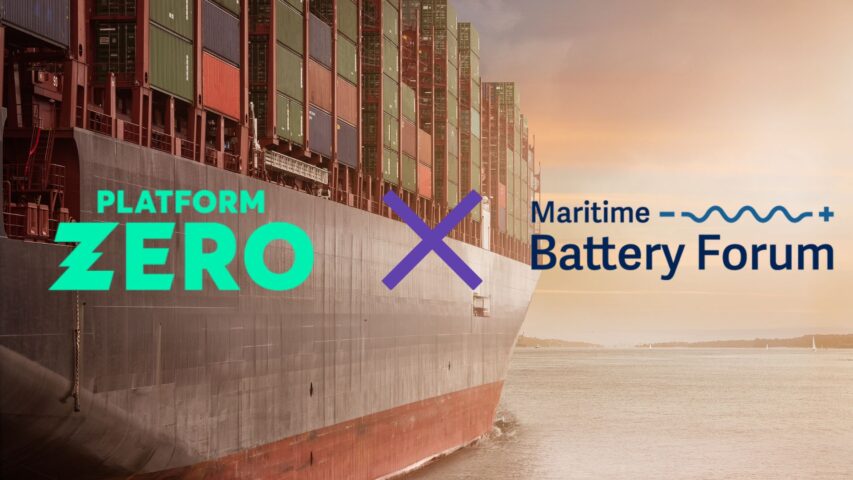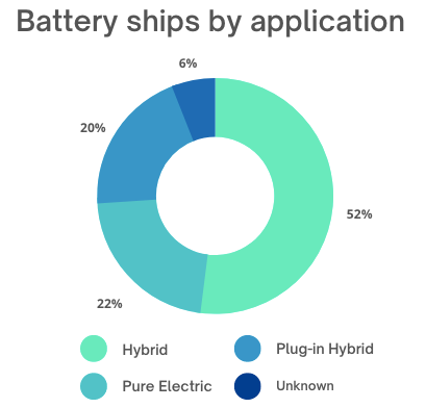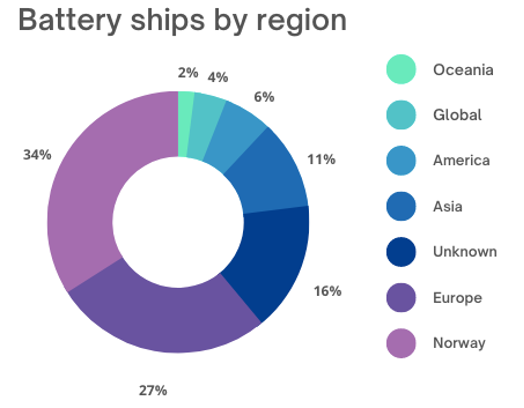The opportunities, challenges, and the latest developments of electrification in the shipping industry


As observed in ‘analysing 60 startups on decarbonisation in shipping’, multiple solutions play an important role in creating a shipping industry that is truly sustainable. The industry needs all feasible solutions to make a significant impact. A cooperation between Platform Zero and Maritime Battery Forum resulted in the identification of the opportunities, the inhibitors, and the latest developments of electrification in the shipping industry. Maritime Battery Forum is a non-profit organisation promoting batteries in the maritime industry through sharing knowledge and information and by building a global network of maritime battery enablers.
The large-scale use of batteries in the shipping industry is gaining traction. Whereas in 2016 only 106 ships worldwide were electrified, currently 552 electrified ships are in operation and 194 ships are on order as stated by the Maritime Battery Forum’s Ship Register. Amongst these are pure electric, plug-in hybrids and hybrids. Interestingly, 34% of these operating ships are based in Norway.


Conservatism propels change
Electrification in shipping is not a matured market. The shipping industry has been known to change slowly. However, the tide is now changing rapidly, resulting in large-scale opportunities. Because this change is still early stage, many of the companies that focus on this subject are start-ups. Simultaneously it has been identified that fully electrifying cargo ships is characterized as a “wicked problem”. The technology is there, it is possible to make ships fully electric, however, one party cannot carry the costs of a systems change alone. As was also mentioned in the report ‘Decarbonizing shipping: All hands on Deck’ of Deloitte.
Talent outflow inhibits accelerated change
There are currently three main obstacles identified limiting the growth of electrification in shipping.
- First, the extraction of scarce minerals for lithium-ion batteries has been connected to several controversies. Mining has done irreversible damage to nature. Also, the use of child labour is not uncommon in the countries’ various cobalt mines as was identified by McKinsey.
- Second is the challenge of setting up a functioning infrastructure. Batteries currently do not have a sufficient energy density and low enough cost to allow cargo ships to sail long distances economically. Therefore, increasing the number of charging points along the sailing route is necessary. Various ports and shipbuilders are now experimenting with interchangeable container battery packs.
- Finally, there is the obstacle of talent outflow. The overall knowledge about electrification within the shipping industry is lower compared to for example the automotive industry. For a large part, this has to do with the average pay an electrical engineer receives in the shipping industry.
Different types of batteries in shipping are on the rise
There is a big variation between the type of ships and their eventual end purpose. Obviously, this also means different ships have different electrification needs. When we look at the choice of batteries in shipping, we see the following developments. Lithium-ion batteries are still the most dominant. However, within lithium-ion batteries, major diversification is happening. Formerly standardized types dominated the market which inhibited the use of batteries for many ships. Currently, there are batteries, that are produced as cheaply as possible, selected on its weight, chosen on the number of cycles they can perform, or designed specifically to recharge as fast as possible. As was stated lithium-ion batteries are still dominant. However, extensive research is being done on the development of different types of batteries that can compete with lithium-ion in the near future. E.g. sodium-ion batteries unfortunately for now these batteries have a lower energy density than lithium-ion batteries.
Three companies drawing attention
‘The performance of lithium ion at a fraction of the cost and risk’ The American battery developer Alsym Energy developed a battery which eliminates the use of lithium and cobalt while replacing this with readily available materials. This solves multiple problems associated with lithium-ion batteries. Definitely a company that sparks attention.

2. Accure Battery Intelligence

Accure developed advanced battery analytics software which can be used for the maritime sector, automotive industry, and grid storage. It maps a battery’s safety, reliability, and lifetime through cloud computing. A digital solution very relevant for the durability and adoptability in the maritime sector
3. Beyonder
Beyonder develops lithium-ion batteries as sustainable as possible. They ensure this by changing Norwegian sawdust into battery cell technology. The company tries to eliminate negative externalities related to the production of conventional lithium-ion batteries, making them a company very relevant for the future.

